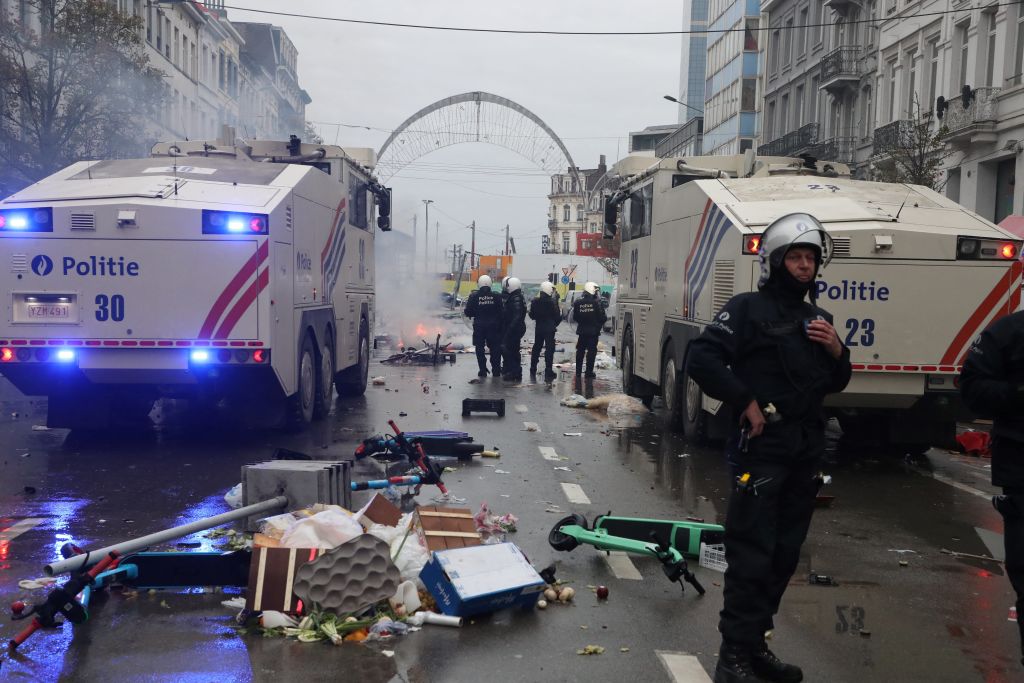One of my most delightful sporting experiences was watching the 2018 World Cup match between England and Tunisia in a Parisian bar. My English friend and I were heavily outnumbered by Tunisians but we were made to feel welcome in a festival of dancing and singing. Even when Harry Kane scored a late winner it didn’t dampen the spirits of the young Tunisians, many of whom were beer-drinking women.
I imagine they celebrated long into the night last week when Tunisia beat France in the World Cup, a shock victory that was greeted with good-natured joy by Tunisians across France.
Another North African nation has also been making its mark in Qatar, and Morocco’s defeat of Spain on Tuesday took them into the quarter-final of the World Cup for the first time. It came down to a penalty shootout and when Achraf Hakimi buried the winning spot kick into the back of the Spanish net it sparked jubilant scenes in Morocco led by King Mohammed VI.
The media coverage of the trouble has been similarly muted
The scenes in Europe were different. Shops were pillaged in Paris, police were attacked in Lille and elsewhere across the country, and in Nice there was chaos for most of the night as hundreds of young men draped in Morocco flags vandalised a tram and caused disruption to hundreds of commuters.
Something similar happened in Brussels – and not for the first time during the World Cup. When Morocco beat Belgium 2-0 in a group game last month hundreds of Moroccans celebrated by burning cars and attacking the police; not only in Brussels but also in Antwerp and Liege. There were also incidents involving Moroccans in Holland where a crowd of several hundred targeted the police with fireworks, rocks and bottles.
‘Sad to see how a few individuals abuse a situation to run amok,’ remarked Belgium’s interior minister Annelies Verlinden, attempting to play down the disorder.
The media coverage of the trouble has been similarly muted. Scan the reports and there is one word missing from all the coverage: ‘hooligans’. In contrast, when it was reported last month that there had been some football-related trouble in Tenerife between Englishmen and Welshmen, the British press rightly described the troublemakers as ‘hooligans’. But why the reluctance to attach the same label to Moroccans? Might some of the liberal press fear being thought of as racist or Islamophobic?
Morocco is part of a long history of hooliganism; one might even say they are the new England. In the 1980s and 1990s it was English fans who exported hooliganism across Europe, what came to be called the ‘English disease’. The disease hasn’t been totally cured, as the ugly scenes at last year’s European Championship final at Wembley proved; on that occasion scores of what the Sun described as English ‘thugs’ and ‘yobs’ tried to force their way into the stadium. Nonetheless hooliganism in England is nowhere near as virulent as it once was. Better policing and tighter controls on troublemakers, along with the gentrification of football, got the disease got under control.
A decade ago Russian hooligans emerged as the new menace to European football; in 2016 well-organised gangs travelled to France for the European Championships with the sole intention of beating up English fans. They did, in Marseille, in a series of vicious assaults that were recently the subject of a French documentary.
But more recently hooliganism is a ‘disease’ borne by an element of Moroccan football fans. There were violent scenes in Belgium and Holland in 2017 after Morocco beat the Ivory Coast to qualify for the 2018 World Cup. More than twenty police officers were injured in Brussels as Moroccans ransacked shops and torched cars. In reporting the trouble the BBC refrained from calling them ‘hooligans’.
In condemning the riots of 2017 Belgium’s interior minister, Jan Jambon, said that ‘living together means respect’. But Moroccan hooligans have no respect for their adopted country. That is the cause of the violence, it’s their way of expressing their contempt. It explains why football fans didn’t burn and pillage parts of Casablanca and Rabat on Tuesday evening.
In Amiens on Tuesday night a group of Moroccan hooligans hoisted their national flag above a district’s town hall, a provocative gesture that elicited a wishy-washy response from the city council. ‘The City of Amiens understands the joy of the many French people of Moroccan origin present in our city and shares it, however, the town hall of the northern sector is a public building and cannot be decorated with the colours of the Moroccan flag.’
There has been a more robust response from the right. ‘What dishonour!’tweeted Eric Ciotti, a Nice MP, who is running to be the next president of the Republican party. ‘This highly symbolic act is a real declaration of secession. Multiculturalism is gnawing away at us.’
Saturday promises to be a busy day for the French police what with two quarter-final matches; in the first Morocco play Portugal and in the evening France face England.
The worst-case scenario for the French authorities is if Morocco and France both win on Saturday; four days later they’ll meet in the semi-final. If Moroccan hooligans celebrate their victories by looting shops and torching cars, what might they do when they lose?







Comments